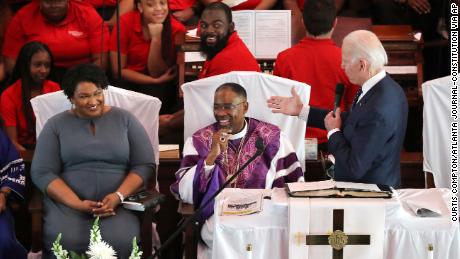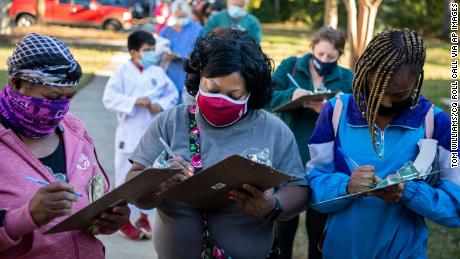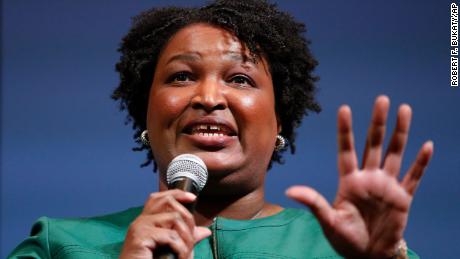For Stacey Abrams, revenge is a dish best served blue
As a nervous nation waited for results of the second of two US Senate races, this one between incumbent Republican David Perdue and Democratic newcomer Jon Ossoff, Abrams remained optimistic.
She’s key among those organizers. Abrams, the 2018 Democratic gubernatorial candidate, has devoted years to expanding the electorate and boosting turnout in the state, which had been reliably red for decades.
“Stacey has tirelessly worked to get Joe Biden and the Democratic National Convention to pay attention to Georgia, spending years organizing and strategizing to make sure Georgians have their voices heard at the polls,” said Nsé Ufot, CEO of the New Georgia Project, an effort launched by Abrams in 2013 to grow the electorate. “We wouldn’t be in the position we are in today without her leadership.”
“My heart is full,” she tweeted after the November elections. “We are just getting started.”
Georgia’s demographics are changing
Georgia had voted Republican in eight of the past nine presidential elections. But explosive growth and changing demographics are expanding Democrats’ base and turning the state purple. Republicans may no longer be able to count on the Peach State.
Leaders like Abrams, who has pushed Democrats to pay more attention to the state, have helped hasten the shift.
Last year, Abrams and her former campaign manager wrote a 16-page document filled with data and trends on Democratic voters in the state. They described it as a blueprint for victory in 2020.
“With a diverse, growing population and rapidly changing electorate, Georgia is not a future opportunity for Democrats; it is a necessity right now,” it said. “Georgia is every bit as competitive as perennial battleground states. With one of the youngest and the most African American electorate of any competitive state, Georgia has demographic advantages that don’t exist in other states.”
Georgia also has a growing Latino population and booming communities in and around the Democratic stronghold of Atlanta.
The state’s shifting demographics have played a key role, but so have investments in recruitment, training and support for candidates from minority communities, Ufot said.
The New Georgia Project said last week it has registered about 500,000 new voters. And it plans to continue knocking on doors.
“We have folks on the ballot who are in our communities, speaking with voters and putting forward policy initiatives that reflect the needs of people within our state,” Ufot said. “When people feel heard, they feel encouraged.”
Abrams has diversified the state’s politics
Abrams, 46, graduated from Spelman College and Yale Law School and served in the Georgia House of Representatives for over a decade.
Abrams’ strong 2018 campaign and grassroots efforts have made her a rising star in the Democratic party. In 2019 she became the first Black woman to deliver the official Democratic response to a State of the Union speech.
This year she was among the top candidates considered as potential running mates for Biden. Trump’s campaign mocked her, saying she was on a “desperate audition” to become Biden’s vice president, but Abrams was not coy about her ambitions.
“But it’s not about attention for being the running mate, it is about making sure that my qualifications aren’t in question, because they’re not just speaking to me, they’re speaking to young black women, young women of color, young people of color, who wonder if they too can be seen.”
“I had two messages. One, voter suppression is real and we have to have a plan to fight back. Two, Georgia is real. You’ve got to have a plan to fight here,” she told CNN this week. “We were very privileged to know that by the time Joe Biden won the nomination, he had Georgia on his mind.”
Her 2018 loss taught voters key lessons
Abrams remained defiant when she ended her bid for governor.
“Let’s be clear — this is not a speech of concession, because concession means to acknowledge an action is right, true or proper,” she said. “As a woman of conscience and faith, I cannot concede that. But … the title of governor isn’t nearly as important as our shared title — voters. And that is why we fight on.”
“After 2018, we all continued the fight to make sure that would not happen to the people of Georgia again,” Ufot said. “Through grassroots organizing, we have been able to register more voters and get more people to the polls.”
Meanwhile, more Democrats across the nation are recognizing Abrams’ contributions.
Wisconsin Democratic Party Chair Ben Wikler said this week that her efforts have been felt beyond Georgia.
Thanks in part to Abrams, Georgia may now be a perennial battleground too.
CNN’s Eric Bradner contributed to this report.
![]()










